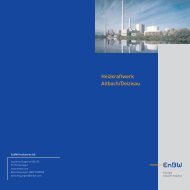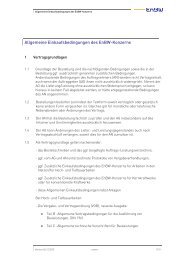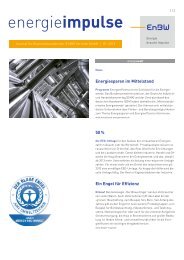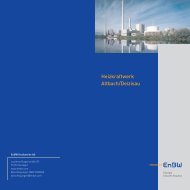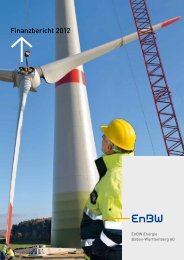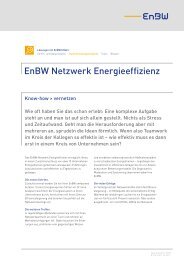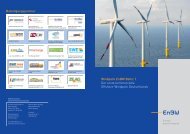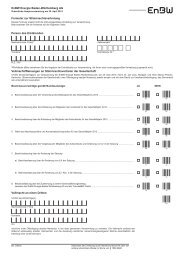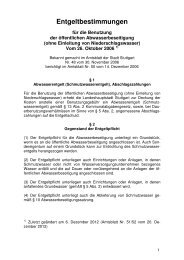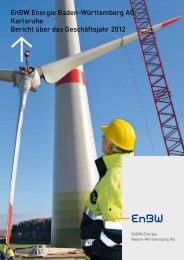2008 I 2009 Sustainability Report - Econsense
2008 I 2009 Sustainability Report - Econsense
2008 I 2009 Sustainability Report - Econsense
Create successful ePaper yourself
Turn your PDF publications into a flip-book with our unique Google optimized e-Paper software.
Changing climate<br />
Ever since the publication of the 4th report<br />
of the Intergovernmental Panel on Climate<br />
Change (IPCC) in 2007, our view of the<br />
world and its vulnerability has changed dramatically:<br />
this concerns the way we use energy,<br />
the role of companies in society, the<br />
expectations of industry with regard to a<br />
global political framework and, last but not<br />
least, also our expectations of international<br />
political cooperation. The fight against climate<br />
change is one of the most pressing<br />
challenges facing humankind today and<br />
calls for a new global mindset and new<br />
courses of action. This is why in-depth engagement<br />
with the issue of climate change<br />
is not only part of EnBW's responsibility<br />
towards society but is also in line with the<br />
company's core economic interests. "We<br />
must not allow climate protection to become<br />
a passing fad", is how EnBW CEO<br />
Hans-Peter Villis describes his approach to<br />
this topic.<br />
For a number of years now, EnBW has actively<br />
engaged the issues of climate change and<br />
climate protection. As long ago as 2006, we<br />
were the first German industrial company<br />
to stage a climate conference, bringing the<br />
worlds of business, science and politics together<br />
around the same table. The final document,<br />
the "Berlin Declaration", calls for<br />
compliance with the two-degree target and<br />
therefore a 50% reduction in worldwide<br />
emissions by the middle of the current century.<br />
The Berlin Declaration also serves as a<br />
catalyst for the creation of groups of entrepreneurs<br />
who are pushing for a climatefriendly<br />
political framework. Today, EnBW<br />
plays an active role in the initiative "2 Degrees<br />
– German Entrepreneurs for Climate<br />
Protection", in the "Industry for Climate Protection"<br />
initiative of the Federation of German<br />
Industries (BDI) and in the climate<br />
group" 3C – Combat Climate Change".<br />
The IPCC and broad sections of the climate<br />
science community as well as the European<br />
Union are urgently calling on countries<br />
around the world to ensure that global<br />
warming does not exceed a level that would<br />
represent an increase of approximately two<br />
percent compared to pre-industrial times.<br />
They believe that only within this corridor<br />
will we be able to master the consequences<br />
of global warming to an acceptable degree<br />
and avoid extremely dangerous climate<br />
change. This challenge is made even more<br />
formidable by the – in some cases rapid –<br />
growth of national economies around the<br />
globe. The world's hunger for energy is<br />
enormous. According to the International<br />
Energy Agency (IEA), the world uses almost<br />
twice as much energy today as it did at the<br />
beginning of the seventies, and the figure is<br />
set to increase by at least a further 50% by<br />
the year 2030. If we carry on with "business<br />
as usual", the energy-related CO 2 emissions<br />
would increase by an additional 55%.<br />
The next important milestone in the field<br />
of international climate policy is the Copenhagen<br />
summit in December <strong>2009</strong>, when<br />
agreements must be reached to ensure that<br />
the Kyoto Protocol in place until 2012 is replaced<br />
by a comprehensive climate protection<br />
treaty. The key issues in the international<br />
negotiations are emission reductions<br />
in the industrialised nations and NICs, the<br />
need to adjust to climate change, technology<br />
transfer and the financing of climate<br />
protection measures in the developing<br />
world and the NICs.<br />
EnBW is in favour of an effective global climate<br />
protection treaty encompassing all<br />
the most important nations. Worldwide<br />
greenhouse gas emissions need to be halved<br />
by 2050 if the global temperature increase<br />
is to be limited to two degrees Celsius. The<br />
most effective and above all most cost-efficient<br />
road to climate protection is via a<br />
global market system for emission certificate<br />
trading. In the coming years, the central<br />
challenge will be to integrate the established<br />
and functioning emissions trading<br />
systems with the aim of creating a standardised<br />
worldwide price for greenhouse<br />
gas emissions in the medium to long term<br />
in order to prevent distortion of competition.<br />
This would also improve the predictability<br />
of planning and investment<br />
costs.<br />
9



